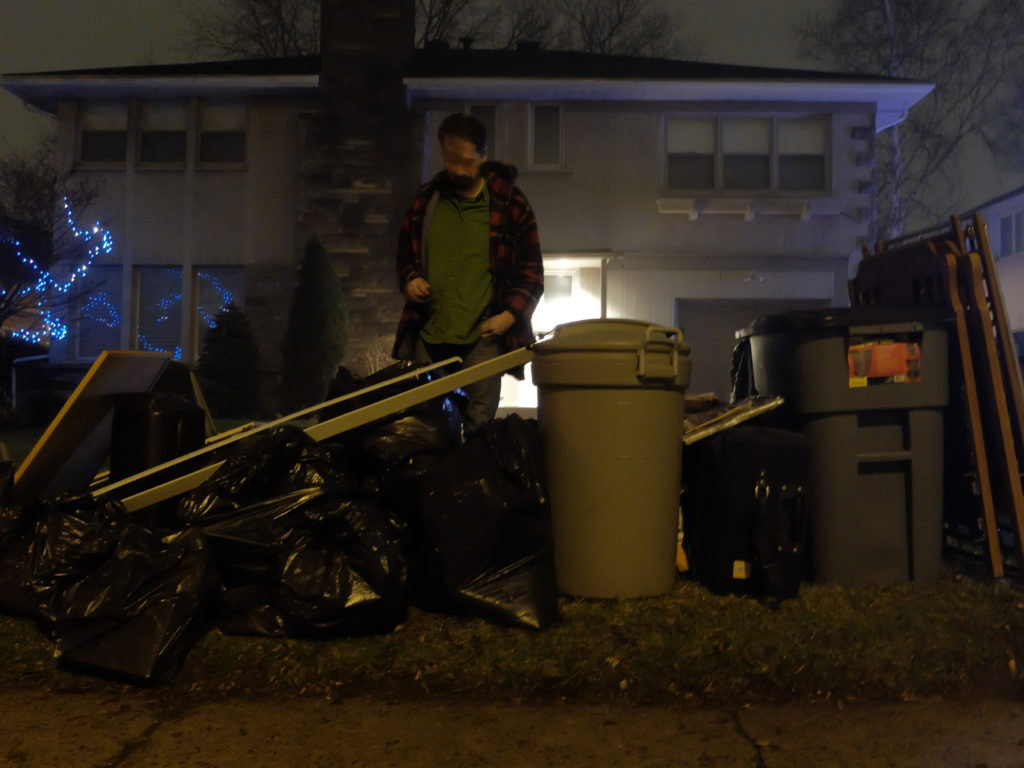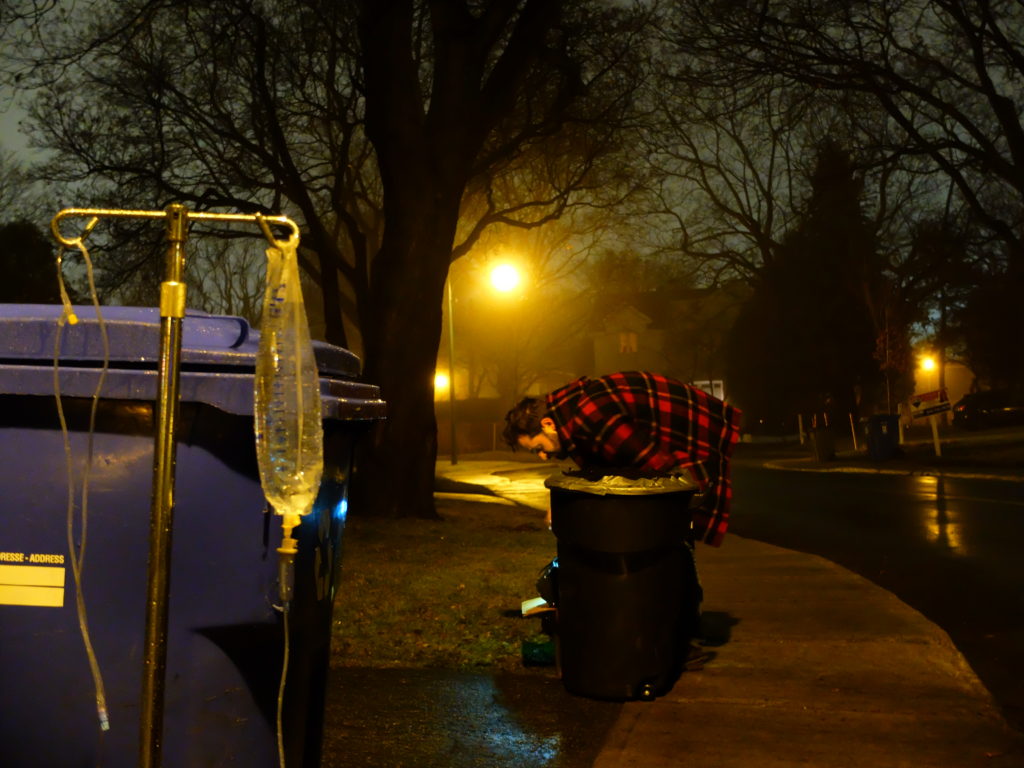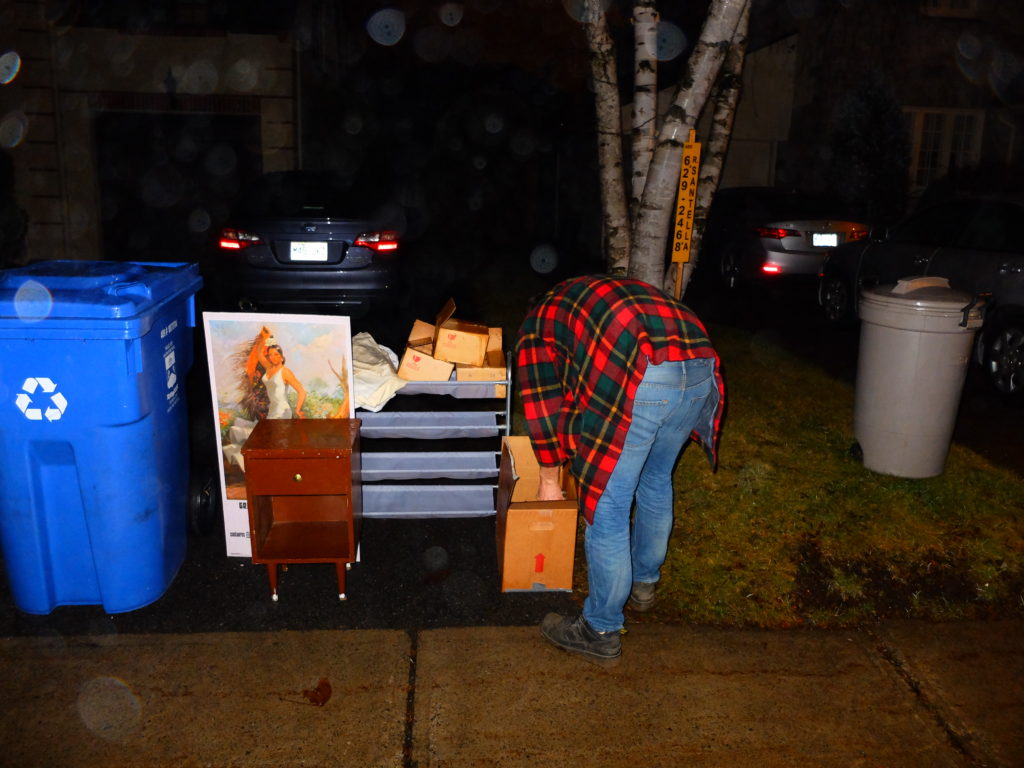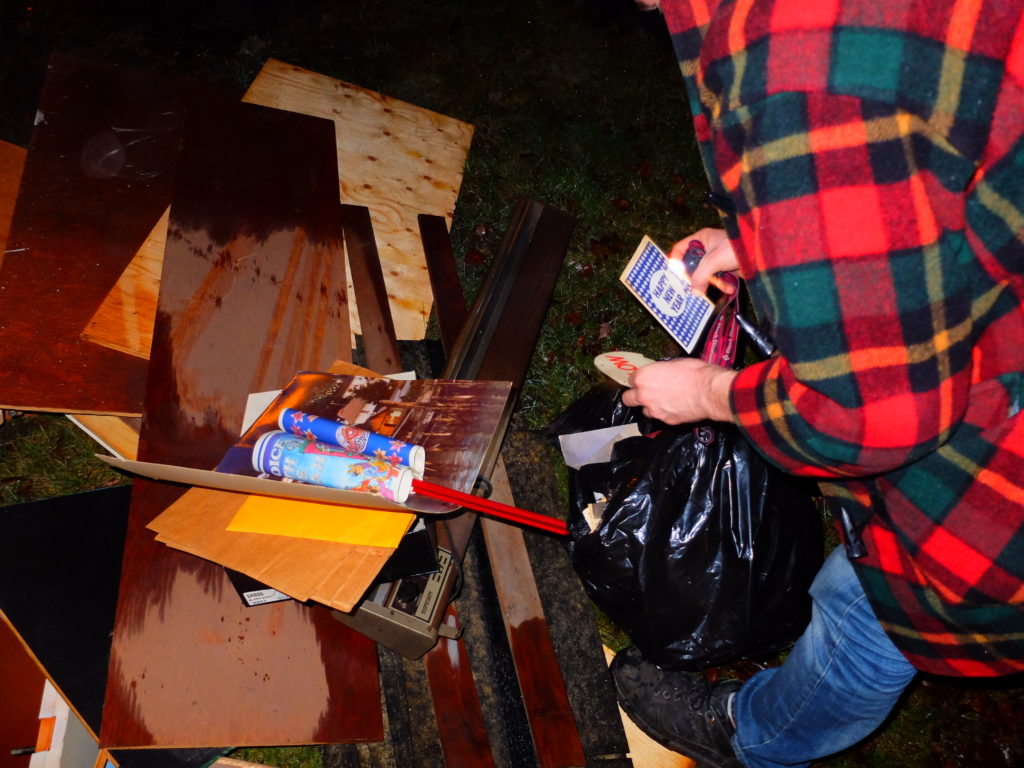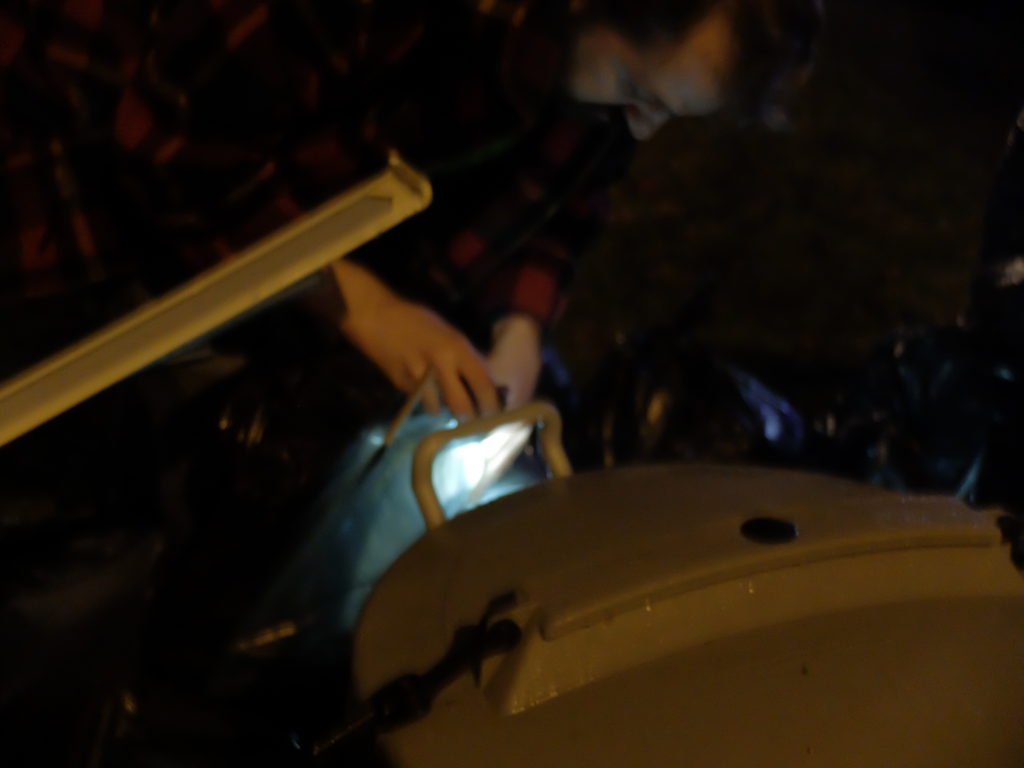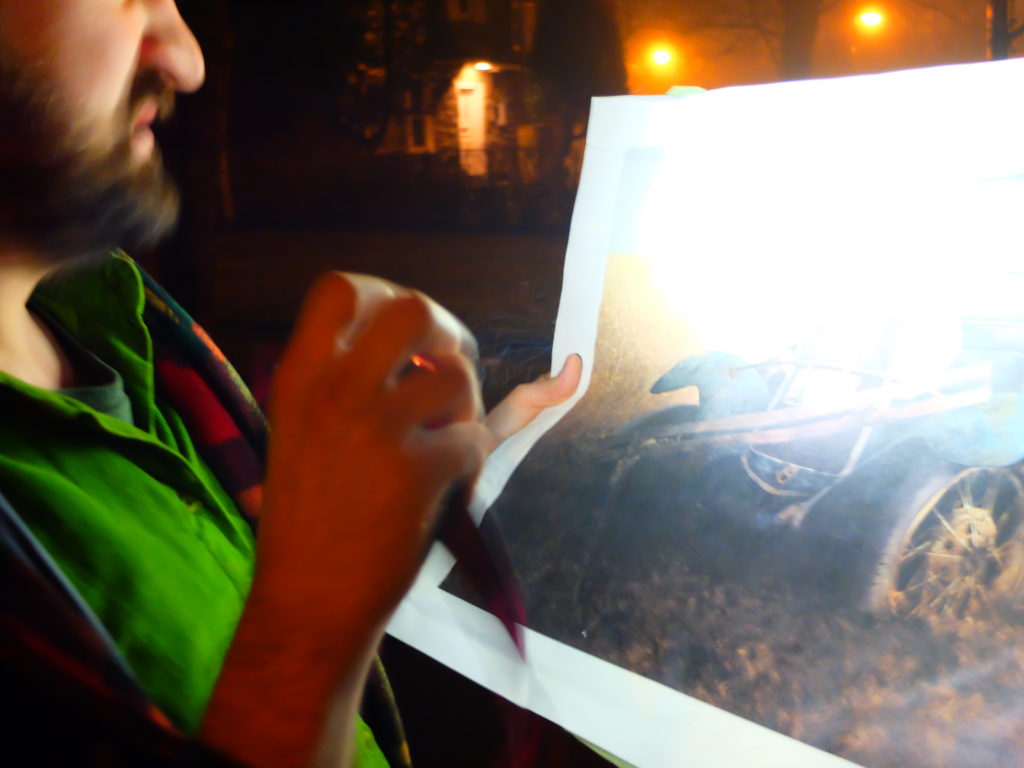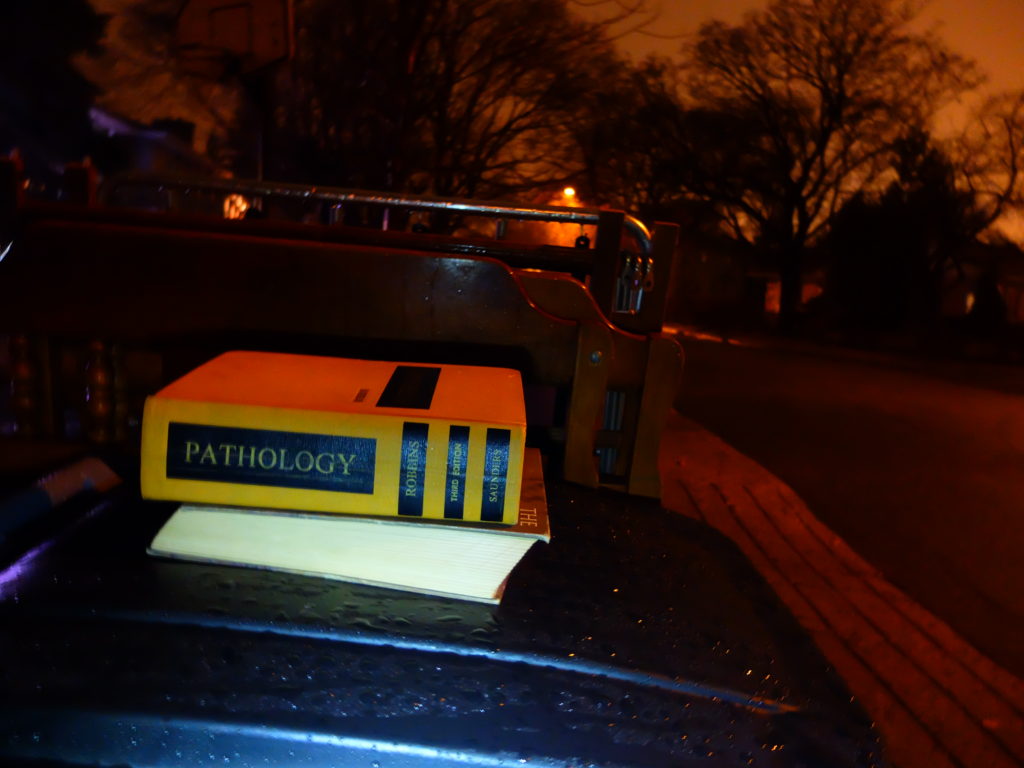by Aaron Vansintjan
There are people who don’t think twice about throwing something away that others might think very valuable. There are also people who are willing to give society’s discards value once again. Martin is one of those people. Martin collects trash for a living. He also runs the popular blog, Things I Find in the Garbage, which has 1,167,429 hits and 5,940 followers.
One winter night Martin drove me around the super-rich Montréal neighbourhood, Town of Mount Royal (TMR). We talked in the car—Martin shared some (dumpstered) tea from his (found) Thermos—and, once every so often, stopped at a promising pile of trash. We had to be careful to avoid getting in trouble with the security. It was two days before Christmas but there was no snow on the ground, and there was an occasional sprinkle of rain. After rooting through some trash bags and tossing anything we liked in the trunk we would hop back in the car, picking up where we had left off in the conversation. The following are excerpts from that discussion edited for clarity and flow, with some changes suggested by Martin.
Why did you pass that pile?
Ummm. It just didn’t have a good vibe for some reason. It just seemed like, cardboard, or maybe they’re working on a new bathroom and bought some new shit. Renovation kind of stuff.
So you’re looking for the small things.
Yeah. Small things are good. Well, it’s also just the look of the pile. It’s hard to explain. If you see kind of vintage-ey stuff, that’s good. For sale signs, that’s very good. Because those people are moving, or whatever. There’s a lot of cost-benefit analyses going on my head. Trying to figure out what’s worth the time, you know?
What distinguishes you from others doing this kind of work?
The trash bag. That’s the thing that really makes me a pro, I guess. It’s the fact that I’ve realized that most of the good stuff is in trash bags. A lot of people when I tell them most of the stuff I find is inside bags, are very surprised. And then I’m surprised that they’re surprised. I wouldn’t be able to make a living just picking from open boxes.
I love the bag system. The bags give off a lot of information. You can tell by the shape of them, by the color of them, the quantity of them. But when you have these giant dumpsters, there’s not much information you can glean from that.
What are some things you’ve learned from doing this?
I feel like I kind of know these people in a weird way. Even though I don’t really but I know parts of their story. Often times they’re passed on or whatever. It’s kind of a strange thing. To develop attachments to garbage or people who provide it. (There’s a long pause.) That’s the most interesting part about it, learning these stories and finding this cool old stuff. Because I’m also interested in history, and the history you find when trash picking is pretty interesting.
I’ve learned a lot about how much privilege rich people have. How much different the lifestyle is between rich and poor. Especially when I’m going through this kind of neighbourhood. The kind of things that rich people casually toss away is unbelievable for someone in my position. I remember when I was growing up we needed this special calculator for this high school class, the TI-83+.
They were so expensive!
Yeah. It was actually a stressful family expense, to buy these calculators. Then at a place in Westmount, I found two. Just thrown out. Just another world. The craziest thing to me might be the guy in Westmount who threw out a jar of change, of 56 bucks. This jar of change. This guy just didn’t have the time to… He worked at the bank, actually. He was a banker. At a certain point that’s just junk change to you. And I just can’t, it’s so hard to imagine a situation, where I would even throw out 50 cents. 50 dollars is just insanity.
It’s like we live in a world of disposability.
And privilege. I can spend a dollar on something and not worry too much about it. If you’re making $2 million a year, you can spend $100 and not worry about it. It’s just different, a totally different scale. (A pause.) The only difference I guess is that I’m spending a dollar on candy instead of throwing it directly into the garbage.
[We pass by a street sign I recognize.]
That street is called Algonquin.
They used to live around here, didn’t they?
[We both think about the Indigenous people who continue to fight against the colonization of their unceded land, and how strange it is that a street was named after them in this rich neighbourhood.]
Why do you think there aren’t more people who do this kind of thing?
I think anyone can do what I do, it’s just that there’s a lot of obstacles. A lot of it is social obstacles too. I guess for some people, it’s sort of a social stigma, people don’t want to be seen looking through trash bags at all.
Are you not concerned about that?
I’m not too concerned about it. [But] its pretty much the symbol for undesirable material. The black garbage bag. With some stink lines coming out. Like basically, I’m looking through the actual symbol for all that’s disgusting and filthy and all that. I’m sure there’s more to it, but people definitely get caught up in the symbol.
Are there moments when you do dig through stuff and are just like… oh my god this is the absolute worst.
(Laughs). Oh yeah. Once in a while people decide to mix in the good stuff with just kitchen waste or kitty litter and I’m just like “oh god.” If it looks interesting enough and I can clean it off then I’ll look through pretty much anything. I remember one person dumped a jewelry box into some kitchen waste and chicken bones so for the next half hour I was looking between the chicken bones and all that trying to hopefully find some gold.
Did you?
Ummm. I don’t think I did from that bag. I found some jewelry in a different bag that didn’t have chicken juice in it. That’s why I was so dedicated to that bag. I found some really nice gold cufflinks actually. But that particular bag wasn’t that great. (Long pause). Yeah you have to be willing to get your hands dirty. A lot of people don’t really want to get dirty at all. But I feel connected to it for whatever reason.
Have you had any narrow escapes with the police or security?
There was this one time. I was checking out some trash and this security guard stopped. He asked me what I was doing. I said, “Well, I’m looking through the trash.” He was like, “I’m going to give you a ticket.” I was like, “Whatever, fuck you.” I just got into my car and drove away but he followed me and I left Hampstead and I’m pretty sure he can’t follow me out of Hampstead. (Laughs). That was my moment of badassery. I didn’t face any repercussions for that. I stopped going to Hampstead during the morning. Then I started going at night. Just to avoid that guy, who most certainly hates me now.
I think that’s the only reason why there’s not many trash pickers in TMR. One time I saw a guy. He was an Indian-looking guy, probably from Parc-Ex, on a bike. I never saw him again. I’m pretty sure TMR security takes care of them. (He laughs.) Anyone who doesn’t look like they belong. You know. You know all about power and all of that stuff.
Do you think doing this has kind of influenced or changed how you see those things?
Not too much. I already had kind of a picture. I think more I’ve just come to see the, uh, differentiation between rich and poor is more vivid in my mind now. Before I knew. But now I feel. I guess that’s the difference. I guess I always knew that authority was a weird thing. (He laughs.)
What did we find, you ask? In an email, Martin broke down the proceeds from that night’s trash run:
“I didn’t have the cords for the PSPs, and the Gameboy had a pretty dark screen but I sold them ‘as is’ on eBay for a profit of 65$. The Expo 67 pamphlets (from that spot with the old books) sold recently for 50$ + shipping. The old books await yard sale season, though I did barter a few on the Bunz Trading Zone Facebook page for beer / food. All in all, a solid if unspectacular night (I find about 80$ worth of stuff on an “average” night, but sometimes I’ll find much more or nothing at all).”
(He doesn’t mention the electric can-opener, the solid metal vase, and the in-working-order brand-new stereo system I took home that night.)
Aaron Vansintjan is a co-editor at Uneven Earth and is currently pursuing a PhD at Birkbeck, University of London. He writes about gentrification, food politics, environmental justice, and contemporary politics.
To receive our next article by email, subscribe here.
